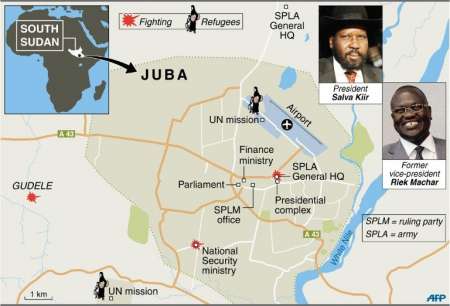South Sudan’s fugitive former vice president denied Wednesday accusations he led a coup bid against his archrival President Salva Kiir after days of fierce fighting that has killed hundreds of people.
South Sudan's fugitive former vice president denied Wednesday accusations he led a coup bid against his archrival President Salva Kiir after days of fierce fighting that has killed hundreds of people and sent thousands fleeing to UN bases.
fleeing to UN bases.
The deadly unrest in the capital Juba has alarmed the international community and sparked fears of a return to civil war in the world's youngest nation.
Kiir on Monday accused soldiers loyal to his arch-rival, former vice president Riek Machar, of staging a coup attempt in the oil-rich but deeply impoverished nation, which has struggled with instability since becoming independent in 2011.
But in comments published Wednesday, Machar denied any attempt to topple the president, and instead accused Kiir of using the violence as a pretext to purge any challengers.
"What took place in Juba was a misunderstanding between presidential guards within their division, it was not a coup attempt," he told the Paris-based Sudan Tribune website in his first public remarks since the fighting erupted.
"Kiir wanted to use the alleged coup attempt in order to get rid of us," said Machar, who was sacked by the president in July.
The government said 10 key figures, many of them former ministers, have been arrested in the crackdown, and that others, including Machar, were on the run.
Amid fears that South Sudan could descend into wider ethnic violence, the United States ordered non-essential embassy staff out of the country.
The fighting has highlighted the bitter fault lines in the country, which is awash with guns after decades of war.
In Juba, gunfire rang out into the early hours of Wednesday, an AFP reporter said, but without the same intensity as the two previous nights.
"It was the quietest night we've had in Juba since the crisis began on Sunday evening," Joe Contreras, a spokesman for the UN Mission in South Sudan (UNMISS)told AFP.
By midday life on the streets of Juba showed signs of returning to normal.
Juba airport reopened and several regional airlines resumed flights, although others said they were waiting for additional security guarantees.
Dozens of foreign aid workers and expatriates said on Twitter they were waiting at the airport to board the first flight they could out of the country.
Many of Juba's residents have spent the past two days barricaded in their homes, too afraid to move. Others used lulls in the sporadic and often intense battles to grab what belongings they could and flee to safer areas, including UN bases.